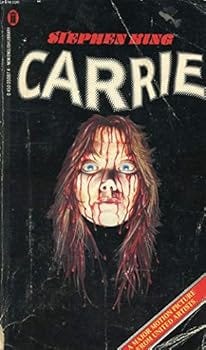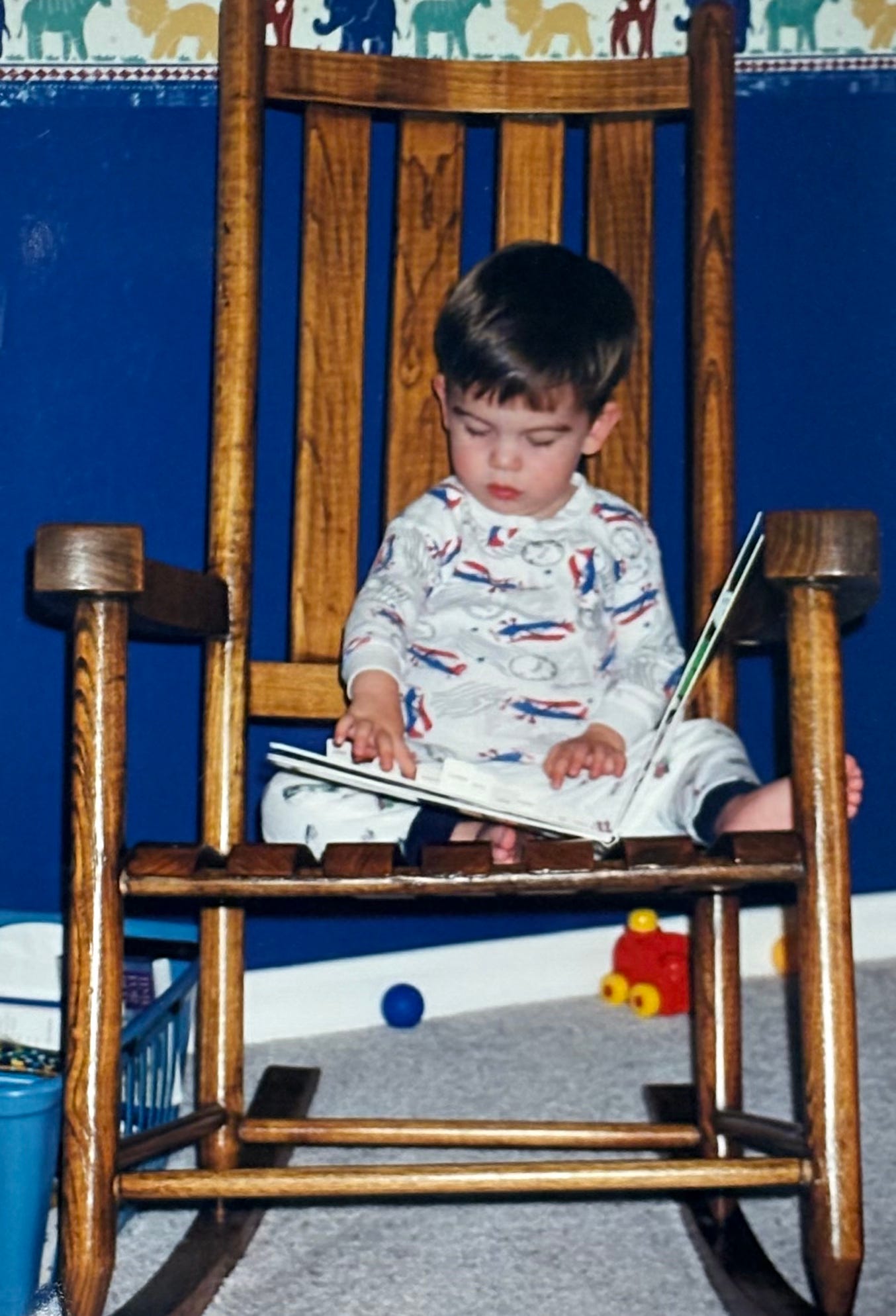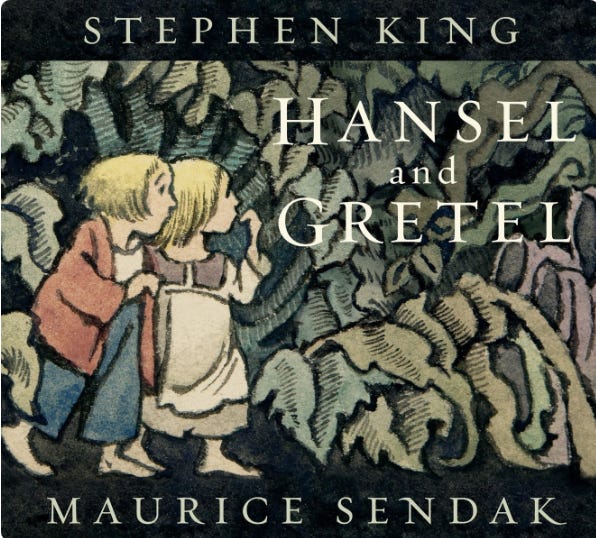I’ve been having fun writing the newsletter for my local indie bookshop, Atticus Books & Music. In the latest issue, I confessed to my love of the horror genre, as a lifelong Stephen King fan.
So in keeping with that theme, let’s start here…
I’m sitting at my kitchen table, a crisp new four-inch thick hard cover King novel open in front of me. My second grader is home after school and we are having one of those rare afternoons when we’re not running to one therapy or another.
Imagining myself a responsible parent, I had set my child up with an after-school snack before I disappeared into my book—into some mesmerizing world where sadistic clowns terrorize children or super-flus threaten to end the world.
Go then, there are other worlds than these.
– The Gunslinger, Stephen King
At some point, I have a vague sense that my son is no longer sitting at the table with me, but is pacing back and forth between the kitchen table and the living room. I’m doling out a pretzel each time he returns, not caring that he’s creating a nice little crumb trail to mark his route.
After a while, I glance up as I’m turning a page and my son is grinning at me, grabbing another pretzel. It takes me a moment to register that something is wrong.
His face is covered in blood. His shirt is streaked with it. Angry red smears coat his hands and arms.
I jump up to examine him. He’s not crying or screaming. There doesn’t seem to be broken bones or huge gashes calling for an emergency room visit.
As I usher my still-blood-spurting child into the bathroom, I pass evidence of the carnage that was going on while I was otherwise engaged: On the kitchen counter, a sticky, wadded-up dishtowel… Spatters of blood mixed with pretzel crumbs cover the floor… A grisly red handprint marks the edge of the coffee table.
Geez, how long was I out? One bloody nose and my house looks like…well, a Stephen King story brought to life!
Not one of my finer parenting moments, but I can get lost in a good book.
I had hoped my son would grow up to be a reader like me. When he was little, it certainly seemed like he was heading that direction. We had many books we loved reading together.
Right now, at 26, his favorite type of reading is looking over my shoulder in the kitchen, as I write him a note about what’s for dinner. 😆
In my son’s early pre-verbal days, I heard autistic adults describe how reading helped them learn to speak. One young man explained how text on a page “stays still” and gives him time to process the information. Verbal language flits by too quickly and is difficult to grasp. I also learned from creative educators who encouraged a focus on literacy, and their words held promise that my son could learn to read.
I have a strong memory of being in the lobby of a music therapy clinic when my son was about five. I looked up from my magazine as a lanky pre-teen boy came bounding into the lobby with his mom. He was excited about something, flapping his hands and bouncing on his feet, a happy-dance that had begun to look familiar to me even a mere two years into this autism-parent thing.
The boy’s mother sat down and pulled a notepad and pen out of her purse, and the boy stood at her shoulder, leaning over to get a clear view of what she was writing. She whispered each word as she wrote slowly. Her son flapped and laughed, clearly transfixed by the written words.
I flooded our son’s life with text. Traditional books, labeled picture cards, captioning on his “sing along” videos. I created “About Me” books to teach our son how to answer questions about his name, his age, our phone number and address. He memorized his biography at that point in time, and for years he would say he was six years old and offer our old landline phone number.
He enjoyed the phonics lessons in kindergarten and we read often at home. I would catch him sitting on the floor in our living room flipping through the pages of a favorite book, “reading” out loud with his mother’s tone and inflection.
He was a be-yooooou-ti-ful butterfly.
One dog WOOF. Two Dogs WOOF. Yap-Yap.
He played with the sounds, the patterns of the language, and even though comprehension was hard to measure, he sure seemed to have fun with books.
My son’s reading level hit a wall around 3rd grade when his typical classmates shifted from “learning to read” to “reading to learn.” But reading has made all the difference in his ability to understand language and to speak.
We’d often play with words and sentences on a whiteboard. I’d write out the phrases he was scripting from his favorite movies or songs. He’d laugh watching the words that fill his head translated into written text, the concrete formation of sounds into letters. The written words would clarify what he was hearing, and he would read the words and adjust his pronunciation.
Except he seemed surprised that Donkey’s question to Shrek when they come upon the ogre’s shack could be written as, “Can I stay with you?” He still preferred to pronounce it in exact Eddie Murphy style: “Cannah stah-wit chew?”
We rely on the written word to communicate with our son every day. I’m constantly reminding myself to stop talking and write it down, to give him concrete words that stay still and help him understand.
He reads aloud the signs we drive past on the street, so I get to hear his voice even if it’s just Open House or Do Not Enter or Starbucks Coffee.
He likes seeing his daily schedule on the table in the morning. I write “social stories” about what to expect for a doctor’s visit or haircut or social outing. And of course, “What’s for dinner.”
I still read books to my adult son.
Of course, books are part of his visual map of our house, so he prefers books to stay on the shelves exactly as they always look. But most days he’ll let me bring a book to him on the couch to read.
Even when he doesn’t seem to be paying attention, if I read something that interests him (like “cookie” or “giggle”), he’ll place his hand on the book to stop me, and scan the page to find the word.
It’s fun for me because I get to read books I wouldn’t take the time to read otherwise—young adult novels about all different kinds of people and places, as well as poetry, adapted classic novels, and non-fiction readers about cars and space and science.
Although we’ve branched out from picture books in recent years, sometimes he’ll indulge me. This new one, I had to read.
In this new version of Hansel & Gretel, my son didn’t catch the breadcrumb King dropped for Dark Tower fans like me (giving us an extra reason to rejoice when this particular witch ends up in the oven).
But guess who perked up at the mention of “gumdrops” and “gingerbread cakes”?
Nibble, nibble, little mouse…
Thanks for being here! Hope you’re reading something good. You can find It’s Like This issues related to communication, learning, visual supports and other stuff here:
Stay Quirky, My Friends INDEX
My only son was diagnosed with autism before the age of 3 and spent his youth giving us a hands-on course in special needs parenting. At the close of his teenage years, we built a home with an attached “apartment” for him. My husband and I are now in our midlife, never-empty-nester phase; my son keeps life interesting around here.
And, you can listen to select issues of It’s Like This on your podcast player: Go here for Spotify and here for Apple podcasts and here for YouTube.
P.S. Thanks to any of you who participated in No Kings on Saturday. It was nice to be out there with others who understand the stakes. We have a lot of work to do.








I have been thinking of you all every week when I volunteer at the library Study Zone - one student comes in regularly to read and displays a lot of the behaviors & reactions you’ve told about here; his mom, who sits with us at the table, is as loving & patient yet guiding & firm as you are. Thank you for these genuine, sweet stories + the insights I can take with me into the world. ♥️
As your writing often does, I was drawn in and gladly swept up in your story! Thank you for opening your heart and sharing your stories, Robin. There was a long period when my children were younger, that I found myself unable to read my normal reading material because I too, would be swept away in the land of that particular book. On a completely unrelated note, my sister was instrumental in bringing the King/Sendak version of Hansel & Gretel to life (she is an editor at Harper Collins).